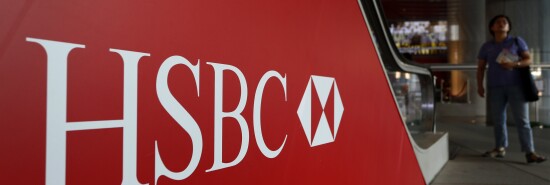
Don’t buy HSBC executive’s fake apology over China propaganda boosting
Tom Rogan
Video Embed
The head of public affairs for Britain’s multinational HSBC bank has sparked controversy by claiming that London was “weak” for supporting U.S.-led measures to restrict certain trade with China.
A former career U.K. diplomat and ambassador, Sherard Cowper-Coles serves with HSBC and as the chairman of the China-British Business Council. He has since stated that “my personal comments do not reflect the views of HSBC or the China British Business Council. I apologize for any offense caused.” HSBC said Cowper-Coles had spoken at “a private roundtable discussion and shared his personal views.”
WHY CHINA’S DANGEROUS SECOND THOMAS SHOAL ESCALATION MATTERS
Only a fool would buy into Cowper-Coles’s contrition or HSBC’s very tentative effort to separate itself from his remarks. Behind the scenes, bank executives will be saluting their PR man for what he’s said. After all, HSBC has one concern regarding China: maximizing money. And HSBC executives know that his fake apology aside, Cowper-Coles’s rhetoric will earn the bank some warm favor in Beijing.
Considering Chinese President Xi Jinping’s escalating regulatory crackdowns, such favor is quite valuable for amoral banking institutions these days. And HSBC is all about getting as much of that favor as it can. In a stunning betrayal of Hong Kong democracy and human rights, for example, HSBC actually endorsed Beijing’s national security law for the city. That law has seen newspapers closed down, opposition politicians threatened across the globe, and activists thrown in prison.
Still, like his employer, Cowper-Coles is similarly obsessed with earning money of a morally questionable nature. While serving as ambassador to Riyadh, for example, this knight of the realm helped to end a U.K. government investigation into compelling evidence that BAE Systems had paid Saudi officials in order to win a lucrative defense contract. After retiring from the Foreign Office, Cowper-Coles then joined BAE. Coincidental?
But the key point here is that Cowper-Coles’s stance on China is exactly why HSBC hired him in the first place. While he’s now pretending to backtrack, Cowper-Coles has long been clear about his views toward Beijing. He makes French President Emmanuel Macron look like a China hawk.
He refuses to comment on Chinese human rights concerns, but he shares no such qualms when it comes to economics and security. A month before the COVID-19 lockdowns began in March 2020, Cowper-Coles was interviewed by the China British Business Council that he chairs. His statements might as well have come from a Chinese Communist Party official. Among them:
Cowper-Coles described China’s debt diplomacy-driven Belt and Road [infrastructure agenda] “as something from which everyone will gain.” On Huawei, which the United Kingdom’s own intelligence services have explained is a Chinese espionage front, Cowper-Coles declared that “America is pressuring countries not to use Chinese technology and I don’t think that’s really for security reasons in any rational sense. Instead, it’s more to do with economic competition and China having a world-beating technological capability that, aside from two Scandinavian companies, the West in general, and certainly America, can’t match.” When it comes to risk-based decoupling in economic relationships, Cowper-Coles sees an idea that “is utterly crazy. In fact, it’s not only crazy, it’s dangerous. What the Chinese call the win-win way forward is for both sides to come together in economic, commercial and investment relationships that benefit everyone.” (This might be news to the Philippines, which currently suffers Chinese win-win cooperation through the barrel of a water cannon).
It would be unfair to single Cowper-Coles out here. The chairman of the U.S.-China Business Council is similarly appeasement minded. And top American CEOs like Blackrock’s Larry Fink and Intel’s Pat Gelsinger are essentially acting as corporate representatives for the People’s Liberation Army. Still, to accept the notion that Cowper-Coles or his HSBC employer regret what he said is the height of delusion.
They love it because Xi will love it. It’s that simple.
